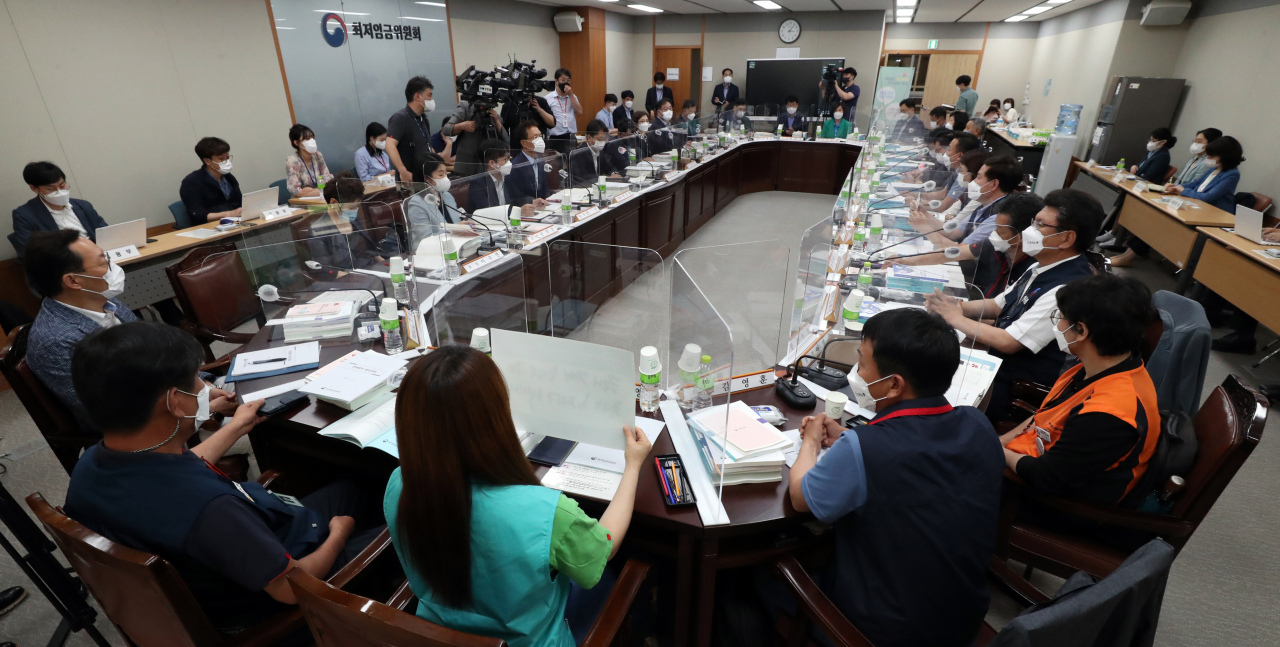 |
The Minimum Wage Commission holds its third plenary meeting Tuesday in Sejong to continue its process on determining the minimum wage rate for 2022. (Yonhap) |
The obstacle-strewn journey to setting next year’s minimum wage level has effectively kicked off, with those representing labor and business presenting starkly different views on how the rate should be set to assist those suffering from COVID-19 pandemic and ongoing economic setback.
This year’s negotiation is the last one to be held during the Moon Jae-in administration, which the labor side has claimed is the final chance to uphold his campaign promise to hike the rate to above 10,000 won ($8.82) per hour during his term.
The Korean Confederation of Trade Unions and the Federation of Korean Trade Unions, the two major umbrella labor groups in South Korea, are planning to announce their demand for next year’s rate on Thursday just before attending the fifth plenary meeting of the Minimum Wage Commission.
The Minimum Wage Commission is a trilateral panel composed of nine representatives each from labor, management and the general public. The commission has until mid-July for its 27 members to settle on a new rate for 2022, which is to be formally announced by Aug. 5.
While the two labor groups have not specified on what their demands would be, it has been widely accepted that they will ask for 10,000 won, up 14.7 percent from this year’s 8,720 won.
The labor side has argued that setting the 10,000-won rate is essential to assure the livelihoods of low-wage workers and their family members. The current rate is so low that even the monthly living costs of single-person households cannot be met.
According to a report from the Minimum Wage Commission from September, the standard cost of living for a single-person household in 2019 reached 2.24 million won per month. But the current rate of 8,720 won only provides about 80 percent of that amount, based on a 40-hour week.
The labor side also asks steep hike is unavoidable through this year’s negotiations, as two previous negotiations ended with 2.87 percent-hike for 2021 rate and 1.5 percent raise for 2020.
Yet the business side claims that the rate should remain steady for this year as well, as two steep hikes of 16.4 percent for 2018 and 10.5 percent raise for 2019, as well as declining sales from COVID-19, are still in effect and haunting business owners’ profitability.
Another hike would worsen their situations, business groups say, which is why business representatives are expected to suggest next year’s rate to stay frozen or even lowered as they did last year.
The Korea Enterprises Federation, one of the major interest groups for businesses, has claimed that the current minimum wage rate is already high enough to assure a minimum standard of living for single-person households.
Experts have also warned that a sudden hike in the minimum wage could result in job losses. A survey from the Korea Economic Research Institute said that raising the rate to 10,000 won per hour could result in the loss of up to 304,000 jobs.
By Ko Jun-tae (
ko.juntae@heraldcorp.com)








![[Today’s K-pop] Blackpink’s Jennie, Lisa invited to Coachella as solo acts](http://res.heraldm.com/phpwas/restmb_idxmake.php?idx=644&simg=/content/image/2024/11/21/20241121050099_0.jpg)